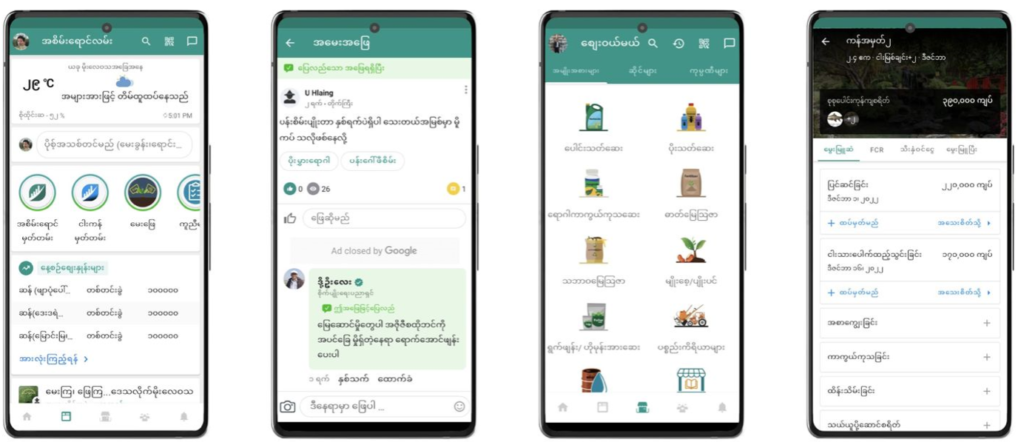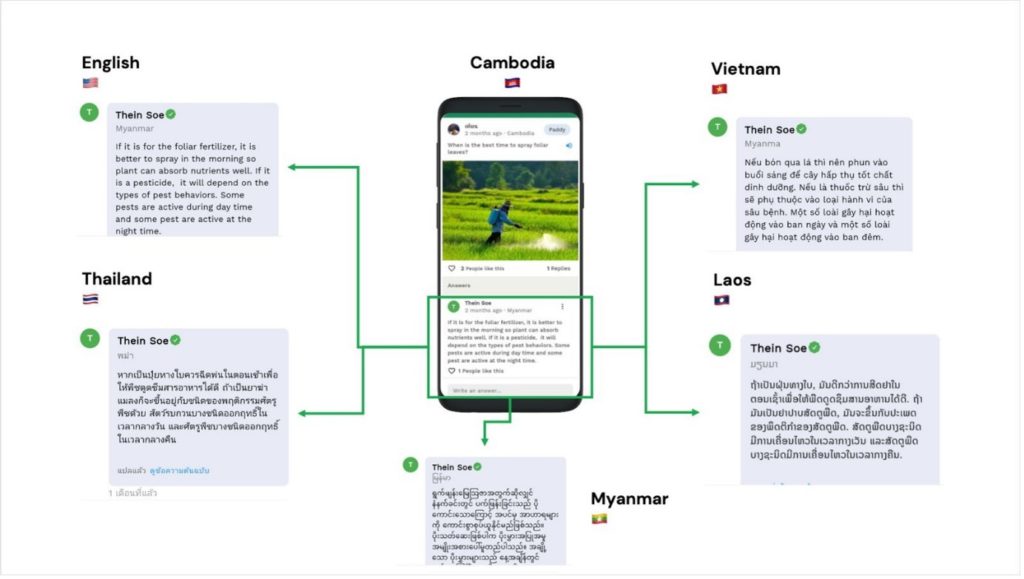Introduction
Greenovator, a member of the GSMA AgriTech Accelerator cohort, is a digital agriculture service provider that aims to empower farming communities to improve their livelihoods. Their services are centred on leveraging mobile to deliver agricultural advisory, weather updates, and market prices to farmers. Extending to wider agricultural ecosystems, Greenovator also offers traceability, marketplace and community features to encourage broader interaction between farmers and other agriculture sector stakeholders.
The co-founders, Thein Soe Min and Yin Yin Phyu are both graduates of the Yezin Agricultural University, Myanmar and, in 2015, their shared passion for improving rural livelihoods led to the setting up of Greenovator, and the launch of its Green Way app, in the country. In this blog, we present Greenovator’s ongoing journey to extend its digital advisory leadership to new markets in South-East Asia.
Green Way: Improving farming outcomes in Myanmar through digital advisory
2014 was a unique time in Myanmar – the country was opening up and saw significant investment in multiple sectors, including telecommunications. The year prior, the cost of acquiring a SIM card reduced from $2,000+ to $1.50, setting the stage for mass adoption of mobile services. The relatively low cost of smartphones, and their widespread availability, also saw the country leapfrog the feature phone era, with a smartphone penetration of around 65% by 2015-16.
Working in the agriculture and development sectors of Myanmar, Thein and Yin saw firsthand how farmers were struggling to get timely and actionable advice from agricultural technicians when it was needed the most. As the country underwent its telecommunications revolution, they saw the potential for using mobile to address challenges in Myanmar’s agriculture, livestock and fisheries by connecting farmers with technicians. This led to the birth of Green Way, a free-to-use app that provides information, services and data-driven solutions, including:
- Knowledge sharing services: curated content across agricultural value chains, livestock, fisheries and aquaculture, nutrition, digital and financial literacy and food safety.
- Business support: digital record keeping, input calculators and market prices across 700 commodities.
- Market linkages: QR codes for certification; ordering inputs and selling farm produce.
- Ecosystem communications: public Q&A with experts, private chats with experts or input shop owners and both public and private chat options with other farmers/groups.

Launched in 2015 Greenovator has partnered with a variety of agriculture sector stakeholders (input sellers, produce buyers and agronomists, to name a few) as well as multiple development sector organisations to reach over 320,000 Green Way registered farmers by December 2023, 26% of whom are women.
The opportunity for regional expansion
Encouraged by the uptake and positive feedback for Green Way in Myanmar, Thein and Yin started exploring opportunities for expansion to create the biggest farming ecosystem in the Mekong region, without borders. Based on their research, they identified Thailand, Cambodia, Vietnam and Laos, specifically, as the most compelling opportunities for a number of reasons:
- Similar agricultural context: With similar crop, livestock and fisheries value chains, climatic conditions and a somewhat similar cultural context, the wider Mekong region would allow Greenovator to continue leveraging their existing set of experts to provide farmers with advisory services at the time of launch, while building collaborations with local experts over time. This would significantly reduce their time to market in the new countries.
- Competitive landscape: While the region has numerous agricultural advisory apps, most are dependent on donor funding and do not have sustainable business models. Having trialled and seen success with their indirect revenue model in Myanmar by keeping the app free for end-users while charging business users for access to their farmer base, the Greenovator team was confident they had cracked a key piece of the puzzle to expand sustainably in the region.
- Understanding of farmer challenges: Their initial research in the new target markets showed similar challenges for farmers and they were confident they could carry their learnings from Myanmar, while customising their offering for the wider region, in light of findings from farmer-centric research conducted in each new market.
- Core product team: Their core team across product management, design and development, have experience in the wider region, giving them confidence around their ability to support regional expansion while understanding local contexts.
Mekong Farm: A multi-country agricultural advisory app
The gap between market analysis and market reality can often be wide. The initial months of setting up and launching a new digital business across multiple markets were not short of challenges.
Navigating the regulatory requirements around company setup came first, with most Mekong markets ranking quite low on ease of doing business. As neither Greenovator nor its development partners were acquainted with the local laws governing company setup in the region, local legal consultants were onboarded. Thein and Yin soon realised that most countries in the region do not have a specific business category for digital agriculture service providers. The co-founders had to spend long hours explaining the nature of their work to regulators and legal advisors, creating delays in company registration. In addition, they had to navigate complex tax structures to optimise taxation costs. As a foreign entity, they also had to face higher costs of registration compared to local companies in some markets.
Building a regional app that allows for communication across markets brought its own challenges. Greenovator’s initial market research showed that farmers in Mekong countries were eager to learn from their peers in neighbouring markets. To facilitate this communication, they had to customise the app to enable in-built translations so that a Cambodian farmer writing a query in Khmer language could be understood by a farmer or agricultural expert fluent in Thai. However, translation service providers they considered all had limitations. Amazon Translate does not cover Khmer or Lao while VoiceTra, a Japanese government service offering high-quality translation, does not offer integration with private sector services. Greenovator thus decided to integrate with Google Translate but realised that some translations were unclear to native speakers. As a result, they have plans to bring in moderators who can provide the right translations to queries, as needed.

Their biggest ongoing challenge, however, is building trust and recognition with farmers and the wider agricultural space within the new markets. Greenovator has built a successful business model in Myanmar, but in the new markets, they do not carry brand recognition. Thein and Yin Yin’s mitigation plan for this is centred around robust partnerships. This is a slow and painstaking process; multiple meetings, relentless questions around the capability of their team and a reluctance on the part of stakeholders in the new markets to take risks on a new entity (Greenovator). However, having relocated to Thailand and Cambodia respectively, Thein and Yin Yin have established anchor partnerships and started to entrench themselves in the local ecosystem through speaking opportunities, extensive farmer interactions and a live app which is starting to convince key stakeholders. They are now focused on hiring local talent in the new markets to bring much-needed market knowledge and networks to the team.
Reflecting on their journey so far, Thein believes his core lesson has been sticking to the basics. “Founders thinking on expansion should remember two key pillars: deep domain knowledge in their chosen field lays the groundwork for success, while a profound understanding of user behaviour, such as the preference of Cambodian farmers for non-typed questions, shapes effective strategies for engagement and growth.”
Yin is looking more to the future, with an ambition to bring more equity and sustainability to the farming ecosystem in the region. “As a female founder, I’m driven by the potential to improve lives through innovation. Let’s use expansion as an opportunity to empower women farmers, advocate for sustainable practices, and create a more equitable food system.”
The GSMA Accelerator support
Over the coming year, the GSMA AgriTech Accelerator will support Greenovator with ongoing User Experience research, product design, growth consulting, monitoring and evaluation, business analytics and investment readiness advisory to further iterate and scale the Mekong Farm service.
The GSMA AgriTech Accelerator is funded by the German Federal Ministry for Economic Cooperation and Development (BMZ) and supported by the GSMA and its members.



